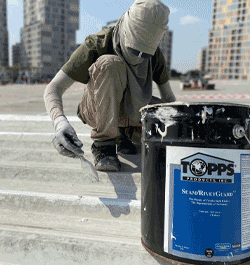UP TO THE MINUTE
Weathering the storm: Navigating Florida's turbulent roofing insurance market

By Cotney Consulting Group.
Here's what you need to know about the recent shifts in Florida's roofing insurance policies and how to navigate insurance nuances in the industry.
The roofing insurance market in Florida changes with the weather: dynamic and unpredictable. The laws, economic problems and complex environment have made the situation challenging. This article illuminates the recent shifts in Florida's roofing insurance policies. We'll examine how the economy, fraud and climate impact roofing materials.
Understanding Florida's evolving roofing insurance market
Florida's property insurance is changing significantly due to new laws and bad weather. Citizens Property Insurance Corporation is a government organization. It gives insurance to Florida homeowners who can't get coverage from private companies. It's not-for-profit and tax-exempt. This corporation is central to the changing situation. Citizens Insurance is essential in Florida because it gives property insurance to people in hurricane-prone areas. Even if private insurers think they are high risk. Citizens Insurance offers basic property insurance coverage, funded by policyholder premiums and potential assessments after disasters. It holds a substantial 18% market share in Florida, double that of any private insurer. Roofers, such as contractors and suppliers, need to adapt to changes and stay effective and compliant. This article explains the current insurance landscape and offers strategies for staying ahead.
New legislation impacting roof insurance policies
The property insurance sector in Florida is experiencing transformative legislative reforms. These laws are designed to protect homeowners and adapt to financial risks. For instance, new regulations now prohibit insurers from denying policy renewals solely based on a roof's age, provided it has at least five years of remaining life.
Insurers are reacting by adjusting requirements. They increasingly require wind mitigation measures for roofs over 15 years old and favor insuring newer homes. This creates a dual challenge for homeowners seeking coverage and the industry professionals who support them.
Economic influences on roofing costs
Inflation and rising costs for materials and labor directly affect roofing insurance premiums. Homeowners are shouldering higher rates, and roofing contractors find it challenging to balance these increases while maintaining affordable services. Policies include inflation protection, but the rapid cost rise often outpaces these measures.
In response, insurance companies are recalibrating strategies. They're tweaking replacement cost values and introducing separate deductibles for roofs. These changes could benefit homeowners in the long run but also add layers of complexity for roofing professionals to navigate.
Combating fraudulent roofing claims
Roofers in Florida have high insurance costs because some contractors are being dishonest. These unscrupulous individuals request business by canvassing neighborhoods offering free roof inspections for storm damage. They convince homeowners they can secure insurance coverage for roof replacements, persuading them to relinquish their rights to file insurance claims. Such contractors often push for roof replacements that aren't needed and misuse litigation, driving up insurance premiums across the board. In response, the state has implemented new legislation that limits the ability to assign benefits, a move intended to curb excessive litigation and the costs that come with it.
Adapting to Florida's climate
Florida's extreme weather conditions significantly shorten the lifespan of roofing materials like asphalt shingles. The state's roofing industry must adapt to more frequent replacements and repairs, affecting insurance policies and premiums.
Recent legislation encourages and financially assists homeowners in improving their roof's resilience. Measures like grants and deductibles for roof claims are being introduced to help mitigate these expenses. An emergency state legislation session will meet on November 13, 2023, to discuss refilling the fund that pays for home hardening grants.
The path forward for roofing professionals
Navigating this shifting market requires roofing professionals to be well versed in insurance policy nuances, the impact of climate on materials, and the necessity of ethical conduct. Vigilance against fraud and adherence to best practices are vital for establishing client trust.
Innovation in roofing materials that withstand Florida's climate is critical. Suppliers and manufacturers must strike a balance between quality and cost.
Educating homeowners about their roofing options and the complexities of insurance is crucial. Roofing professionals can be invaluable advisors, guiding clients through insurance processes and advocating for fair policies.
Understanding roof coatings and insurance eligibility
The insurance cost for condo associations has increased by almost 1000%. This increase has led to confusion regarding roof coatings. Last year, Citizens Insurance released a bulletin to help agents determine if roofs can be insured. When a coating or sealant is used in place of a total replacement, it is vital to understand the coverage eligibility criteria.
Roof coatings: A closer look
- Eligibility review: In cases where a sealant or coating has been applied, the Citizens' Underwriting team will assess the roof's age and condition to determine eligibility for coverage. Underwriters can limit the remaining useful life (RUL) by 1-3 years for structures that have received coating updates. The roof's condition will be verified through a comprehensive roof inspection conducted by a licensed roofer or general contractor, which includes capturing the necessary photographs of the entire roof surface and roof line.
- Replacement versus coating: Maintenance roof coatings commonly applied to existing roofs for waterproofing or UV protection, such as acrylic, silicone, urethane, soy, elastomeric or similar coatings, do not fulfill Citizens' criteria for demonstrating roof covering material replacement. Regarding roof replacement, whether a full re-roof involving the complete removal and replacement of the roof covering or a one-time re-cover, Underwriting may require finalized contracts or proposals to verify the use of a Florida Building Code (FBC)-approved roof covering product. Furthermore, a Florida-licensed roofing contractor must carry out this work in strict compliance with the code, and a valid permit should accompany it.
- Inspection assurance: Citizens may conduct inspections to ensure that eligibility requirements are met, promoting transparency and adherence to guidelines.
The roofing insurance market in Florida stands at a crossroads, shaped by legislative evolution, economic turbulence and the relentless force of nature. Roofing professionals are called upon to exercise their skills and integrity, combating fraud and embracing innovation to stay afloat in these stormy waters. As they navigate the complexities introduced by new laws and strive to meet the heightened demands of climate resilience, their role expands beyond service providers to that of trusted advisors and advocates for consumer rights. Looking ahead, the sustainability of Florida's roofing sector hinges on continued education, ethical practice and a commitment to quality that goes beyond the bare minimum. Through these efforts, roofing experts will weather the storm and pave the way for a more stable, reliable insurance market.
Learn more about Cotney Consulting Group in their Coffee Shop Directory or visit www.cotneyconsulting.com.



















Comments
Leave a Reply
Have an account? Login to leave a comment!
Sign In